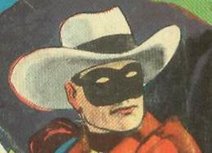
Little Joe was syndicated by the Chicago tribune New York News Syndicate and debuted on Oct 1, 1933. Little Joe was drawn by Ed Leffingwell and written by his cousin Harold Gray. Ed Leffingwell died in 1936 and his brother Robert took over the art chores. Gray quit writing the strip in 1946 and Robert took over the writing as well continuing until the syndicate cancelled the strip in 1969. Leffingwell was Gray's assistant on Little Orphan Annie and stylistically is quite similar. Toss in Gray's writing and philosophy and it's even more similar.
Pictured on the cover with the red plaid shirt is Little Joe Oak, a plucky fellow who lives with his widowed mother on their ranch out west in contemporary time. The fellow in the center is Utah, the ranch manager. A hard-nosed former gunfighter Utah dispenses the philosophy along with fists and six guns when necessary.
Little Joe never appeared as the headliner in any other comic, at least as far as I've ever seen.
Stories in this issue reprints strips from 1936 to 1938. Strips are edited roughly so continuity doesn't always flow smoothly.
The first story begins on the inside front cover. Don Jose owns a large ranch and has been trying unsuccessfully to acquire the Oak's ranch. After his own men beat him he escapes and goes to the Oak's home where despite his past actions he is taken in and doctored. Restored to his health Don Jose attempts to take over the home only to be outsmarted by Joe and run off by Utah.
The next episode begins with Utah away from the ranch when a group of gunmen ride up looking for Black Jack Smith. Joe stands his ground and the group departs. He turns and runs into Black Jack who thanks him. Mrs Oak refuses to allow Black Jack to remain even though he professes his innocence. His timely help in treating her rattlesnake bite changes her perception and he is welcomed. Utah throws down on him when he returns but is swayed by the Oak's defense of Jack. Jack eventually leaves to lead to posse chasing him away from the Oak ranch.
In the third adventure sheepherders move onto the range. Utah naturally objects but the herder and his wife prove to be tough characters. Utah delivers a subtle ultimatum. The sheepherders finally realize he means business and skedaddle.
Utah is expressing his philosophy on how the only thing lower than a sheepherder was an Injun when they run smack into a group. In a fit of bad editing Joe has suddenly become their prisoner when they learn he's the son of Big Joe Oak and send him home an Honorary Chief. They come to an understanding with the Oaks and Utah.
Squatters have moved onto the range and are now fencing it off much to Mrs Oak and Utah's chagrin. Utah takes a hard line trying to oppose the farmers who hired Lawyer Blurb who has advised them regarding filing claims on their plots. Blurb is elected Judge and the farmers have fenced off the Oak's herd from the water. Utah is arrested for attempting to cut the fence and his disdain for Blurb lands him in jail. As the herd begins to die of thirst Blurb attempts to purchase the cattle only to be run off by Mrs Oak. The Indians having heard of the situation return and offer to move the cattle to a secret water source known to them. A dust storm blows up bringing hardship to the farmers. Utah is released after his 90 days is up. 
The page at right is a typical example of Gray's storytelling technique, the tongue waggers and bootstrap philosophy.

Sixty Eight pages including the cover wrap and no ads.
References: Grand Comics Database: 100 Years of American Newspaper Comics, Maurice Horn ed., Random House 1996



No comments:
Post a Comment